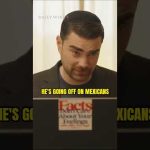In a recent political rally, the provocative nature of comedy collided with the weighty seriousness of political discourse, revealing not just the rift in modern American society but also a greater struggle between humor and hurt. During an event leading up to an important election, a well-known roast comedian was at the center of a whirlwind of criticism. This incident encapsulated a growing tension: the struggle to embrace humor in an age where everything seems to be frowned upon by critics.
Comic roasts have long thrived on humor that walks the thin line between funny and offensive, a cultural phenomenon that has roots steeped in the tradition of satire. This is an art form where exaggeration and discomfort are tools wielded by comedians to make a point or elicit laughter. Yet, in today’s charged political atmosphere, what was once considered acceptable entertainment is often regarded as reckless or cruel. The comedian’s remarks, designed to elicit laughter even at the expense of sensitive topics, sparked an immediate backlash, with critics calling the jokes insensitive, even racist.
This uproar echoed sentiments from the past when cultural arbiters attempted to impose restrictions on music and expressive art, reminding us of past standoffs between freedom of expression and perceived moral authority. Long ago, figures like Tipper Gore sought to label music deemed inappropriate, fostering a sense of resentment among the public. Today’s critics echo those same authoritarian sentiments, wishing to dictate the bounds of acceptable humor. In a light-hearted roast culture, the intention is to poke fun and challenge societal norms; what some see as cruelty, others recognize as an essential part of the comic landscape.
As the comedian faced backlash, observers noted that humor is a powerful lens through which to address societal issues. It reflects thoughts that some may find uncomfortable, yet beneath the laughter often lie truths about life and humanity. This was precisely the argument voiced by fellow comedians and commentators who rallied to defend comedic expression, emphasizing that humor should not be disinfected against harsh realities, especially at political events. By suppressing these exchanges, society risks losing a valuable tool for reflection and discourse.
Furthermore, this incident highlights a broader cultural moment that raises questions about the morality of humor in a politically polarized environment. What is the moral statute by which humor is judged? Can we not view political absurdity with a lens of levity? The irony of a comedian facing scrutiny for using humor to critique the absurdity of political rallies feels reminiscent of Shakespearean dramas where jesters often spoke truths that others could not. The moral conscience of society must allow room for exploration and irony; otherwise, it risks falling into a dull echo chamber devoid of spirited dialogue and critical thought.
Ultimately, the clash between a roast comedian’s humor and the vitriol of political polarization is not merely about jokes lost in translation but the fabric of societal acceptance and the moral framework through which people understand one another. As America navigates the complexities of cultural identity and political discourse, it must also grapple with the delicate balance between freedom and offense. History teaches that society can thrive through humor, revealing truth, and prompting change. It is incumbent upon individuals to remember that laughter, even at its sharpest, can often bridge divides and foster understanding in ways harsh words cannot. In this swirling sea of outrage, it is vital to ponder the immediate reaction and the deeper implications of what it means to laugh in the face of adversity.




